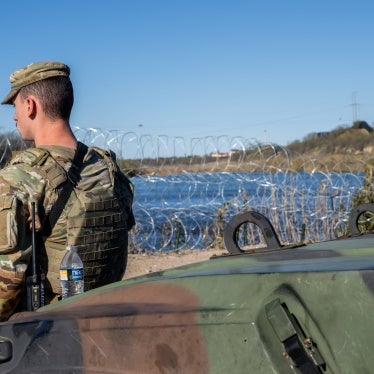(Mexico City) – The administrations of US President Joe Biden and Mexican President Andrés Manuel López Obrador are forcing thousands of people seeking asylum in the US to wait for months in Mexico, exposing them to danger, Human Rights Watch said in a report released today.
The 68-page report, “We Couldn’t Wait: Digital Metering at the US-Mexico Border,” details how the Biden and López Obrador administrations have made a difficult-to-use US government mobile application, CBP One, all but mandatory for people seeking asylum in the United States. The result is de facto “metering,” a practice formalized early in the Trump administration that limits the number of asylum seekers processed at ports of entry each day, turning others back to Mexico.
“The Biden and López Obrador administrations are knowingly exposing migrants to persecution at the hands of cartels that systematically target migrants for kidnapping, extortion, and sexual assault,” said Ari Sawyer, US border researcher at Human Rights Watch. “The US and Mexican governments should stop forcing migrants to wait in Mexico and should stop collaborating on rights-abusive immigration policies.”
The report is based on interviews with 128 asylum seekers who were able to share information on the experiences of a total of 263 people, including family members and friends with whom they were traveling, as well as interviews with 13 shelter workers, eight migrant service providers, Mexican government officials, and human rights workers. Research was conducted in August and September 2023 in Mexico City; Saltillo and Piedras Negras, Coahuila; Monterrey, Nuevo Leon; Nuevo Laredo, Tamaulipas; and Eagle Pass, Texas. Because US Customs and Border Protection (CBP) does not provide enough appointments through the app to meet the demand from asylum seekers each day, tens of thousands of people seeking asylum have been compelled to wait in Mexico, often for several months, since the Biden administration introduced a new asylum rule in May 2023.
CBP’s nearly exclusive use of the CBP One app to process asylum seekers creates additional barriers to access for those seeking asylum, particularly for certain groups. Many asylum seekers do not have cellphones because they cannot afford them or because criminal actors or government agents in Mexico have stolen their phones. When asylum seekers do have phones, their devices often do not have memory space to support the app, they cannot pay for the data they need to use the app, or they do not have access to Wi-Fi.
In addition, nearly all the asylum seekers Human Rights Watch spoke to described having trouble using or accessing CBP One. For some, the app was particularly difficult to use due to identity factors such as their race, digital literacy, ability to read or write, language, age, LGBT status, or disability.
The Biden asylum rule relies on policies nearly identical to two Trump-era policies—the entry and transit bans—held by federal courts to be illegal. It stipulates that asylum seekers must use CBP One in most cases to access the US asylum system. Asylum seekers who show up at the border without an appointment, who cannot prove they applied for and were denied asylum in another country along their route of transit or certain difficult-to-prove extenuating circumstances, face “enhanced expedited removal” to Mexico or their country of origin without adequate due process.
US and Mexican officials and private security guards hired by the Mexican government stand guard at international bridges and screen asylum seekers for CBP One appointments, turning back those who do not have one. Asylum seekers who face danger if they wait in Mexico often cross over more remote and dangerous areas at the border, where their lives are at risk or where they find their passage blocked by river currents, razor wire, or other barriers.
In just one example in September, Human Rights Watch witnessed a Haitian family attempt for three hours to turn themselves in to US immigration officials near Eagle Pass, Texas, but were impeded by Texas Department of Public Safety boats, river currents, razor wire, and other barriers.
Those who are forced to wait in Mexico also face forced relocation to southern Mexico by Mexican officials; a lack of access to basic services like health care, potable water, and shelter; violence at the hands of criminal groups as well as Mexican immigration authorities, National Guard soldiers, and police; and the possibility of summary deportation.
Cartels and corrupt government officials profit from policies that strand non-Mexican migrants in Mexico for long periods of time. Thanks to these policies, cartels have expanded their business model to include the extortion of the US-based family or friends of kidnapped migrants, Human Rights Watch found. Cartels routinely search kidnapped migrants’ phones for US numbers and demand ransom payments in US dollars. Cartels in Nuevo Laredo extort asylum seekers who have CBP One appointments, threatening to prevent them from getting to their appointments if they don't pay.
“An app-based appointment system suggests the illusion of order and impartiality, but in reality CBP One puts people in danger and means more profit and power for criminal cartels,” Sawyer said. “The United States and Mexico can and should do better.”








